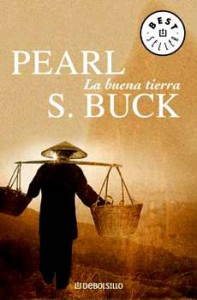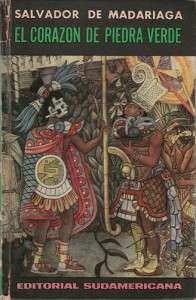La buena Tierra: (Quizás somos hermanos… esperamos verlo)
 La buena tierra
La buena tierra
Pearl S. Buck
Según la filosofía oriental la tierra lo es todo. Este es el hilo conductor de los textos que se han aglutinado en esta reseña y que hacen referencia a filosofías de vida anteriores a la industrialización y a las grandes revoluciones de principios del siglo XX: La buena tierra (Pearl S. Buck), El corazón de piedra verde ( Salvador de Madariaga) y el Discurso del Gran Jefe Seattle.
Salvador de Madariaga) y el Discurso del Gran Jefe Seattle.
La buena tierra de Pearl S. Buck, recibió el premio Pullitzer en 1932, y su autora el Nobel en 1938; sólo en 2007 se encontró su manuscrito. La buena tierra es una novela ambientada en la China pre-revolucionaria, país en el que Pearl S. Buck vivió gran parte de su vida. Esta novela forma parte de una trilogía que se completa con Los hijos de Wang Lung y La familia dispersa. Yo lo leí en la adolescencia a instancias de mi madre y de mi abuela, y me causó una profunda impresión.
De esa misma época recuerdo El Corazón de piedra verde de Salvador de Madariaga que narra el profundo choque cultural que se produjo entre la América precolombina y una España en expansión, y tiene el encanto y la zozobra de la descripción detallada de un mundo en extinción.
 Menos conocido era en aquella época de mi adolescencia (1977) el discurso del Gran Jefe Seattle (1780-1866) que leí ya en la universidad; a día de hoy es un clásico en algunos textos de primera enseñanza por su delicadeza y sensibilidad. Merece la pena escuchar alguno de sus memorables párrafos:
Menos conocido era en aquella época de mi adolescencia (1977) el discurso del Gran Jefe Seattle (1780-1866) que leí ya en la universidad; a día de hoy es un clásico en algunos textos de primera enseñanza por su delicadeza y sensibilidad. Merece la pena escuchar alguno de sus memorables párrafos:
THE GREAT CHIEF in Washington sends word that he wishes to buy our land. The Great Chief also sends us words of friendship and good will. This is kind of him, since we know he has little need of our friendship in return
…
One thing we know that the white man may one day discover. Our God is the same God. You may think that you own him as you wish to own our land, but you cannot. He is the Body of man, and his compassion is equal for the redman and the white. This earth is precious to him, and to harm the earth is to heap contempt on its Creator. The whites, too, shall pass – perhaps sooner than other tribes. Continue to contaminate your bed, and you will one night suffocate in your own waste. When the buffalo are all slaughtered, the wild horses all tamed, the secret corners of the forest heavy with the scent of many men, and the view of the ripe hills blotted by the talking wires, where is the thicket? Gone. Where is the eagle? Gone. And what is it to say goodbye to the swift and the hunt?
The end of living and the beginning of survival.

No puedo imaginar cuál sería la sonoridad en la lengua de la tribu Suquamish a la que pertenecía su autor.
Pearl S. Buck en la Biblioteca UPM
Salvador de Madariaga en la Biblioteca UPM